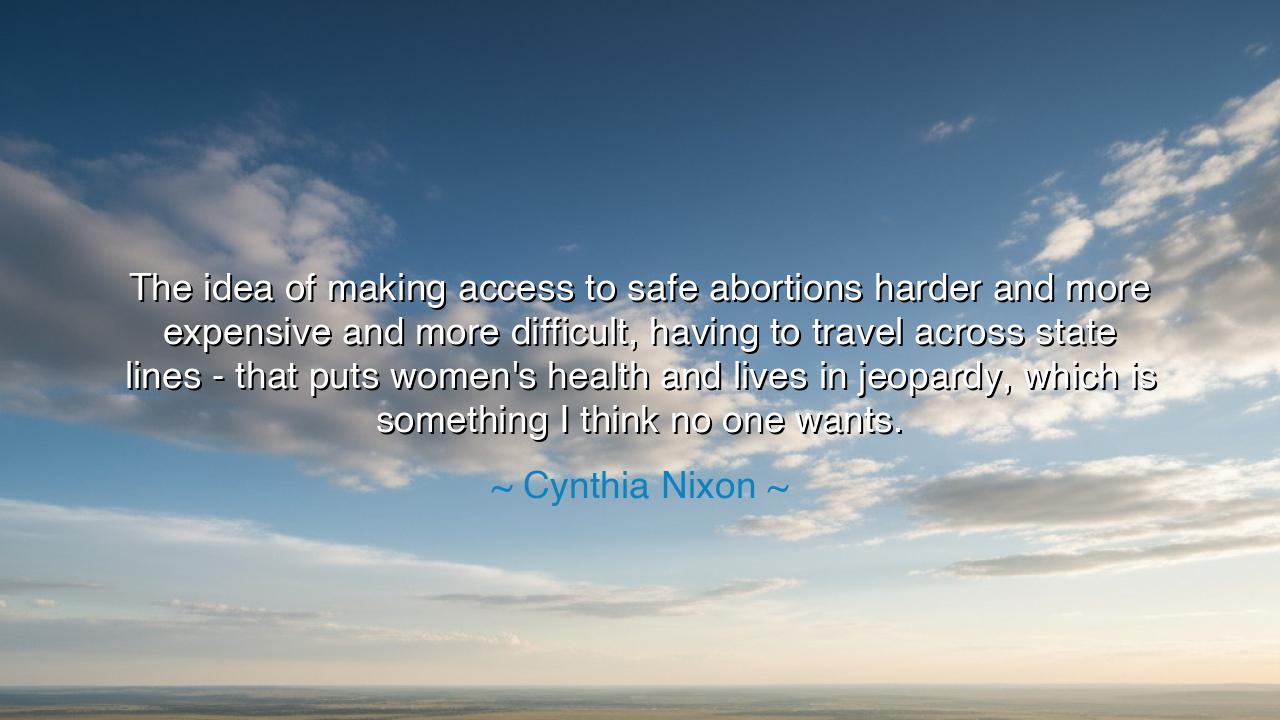
The idea of making access to safe abortions harder and more
The idea of making access to safe abortions harder and more expensive and more difficult, having to travel across state lines - that puts women's health and lives in jeopardy, which is something I think no one wants.






Cynthia Nixon, artist, activist, and voice for justice, once spoke with a tone that was both warning and plea: “The idea of making access to safe abortions harder and more expensive and more difficult, having to travel across state lines—that puts women's health and lives in jeopardy, which is something I think no one wants.” Her words rise not as idle commentary, but as the cry of one who has seen how policy, when stripped of compassion, can endanger lives. In this statement lies a truth both ancient and urgent: when the most vulnerable are denied safe paths, they are forced onto perilous ones, and the cost is borne in suffering, in silence, in blood.
The origin of this reflection lies in the long, painful history of women’s struggle for autonomy over their own bodies. Nixon speaks in an age where legal battles rage across nations, and particularly within America, over the right to choose. But her concern echoes back to centuries past, when safe care was denied and desperate measures drove countless women to risk death in secret. Health and life are not abstract concepts here; they are the very flesh and breath of women whose dignity and safety are imperiled when laws make compassion scarce and care unreachable.
History provides us with many stark reminders. Before abortion was legalized in the United States, hospitals quietly maintained “septic wards,” where women came near death from unsafe and illegal procedures. The toll was not hidden—it was well known to doctors, nurses, and families who lost mothers, daughters, sisters. This tragic reality, born of restriction and silence, was precisely what reformers sought to end through laws that brought medical care into the light of safety and legitimacy. Nixon’s words carry this memory forward, reminding us of what happens when access is curtailed: it does not end abortion, but it endangers women’s lives.
Her imagery of having to travel across state lines speaks to the inequality such barriers create. The wealthy may find means to journey, to pay, to seek care far from home. But the poor, the young, the marginalized—those without resources—are left stranded, their choices stripped away. Thus, the restriction of access becomes not only a threat to health, but a deep injustice, dividing society along lines of privilege and poverty. In such a system, rights become hollow, belonging only to those who can afford them.
And yet, Nixon frames her warning with hope, declaring that this jeopardy is “something I think no one wants.” Here she appeals to the shared humanity that transcends politics: the recognition that no society truly desires to see its daughters suffer, its mothers endangered, its families broken by preventable tragedy. Her words are an invocation of conscience, a call to remember that beneath the arguments and laws lies a simple truth: to protect life, one must protect safe access.
The lesson for us is both moral and practical. Moral, because it calls us to defend the dignity and autonomy of women as fundamental to justice itself. Practical, because it teaches that when safe paths are blocked, unsafe ones emerge, and the consequences are grave. A society that truly values life will not force its people into danger, but will provide safe, compassionate care for those in need. The denial of such care is not a triumph of morality, but a failure of responsibility.
Practically, this means striving for policies rooted in compassion and equity. It means listening to the voices of women, supporting those who lack resources, and ensuring that geography and wealth do not dictate who lives and who suffers. It means choosing to build systems of care rather than walls of exclusion. For when we ensure safety and dignity for all, we not only protect women—we protect the strength and humanity of the entire society.
Thus, Cynthia Nixon’s words stand as both warning and call: “Making access harder…puts women's health and lives in jeopardy.” Let future generations hear them, not as a record of failure, but as a turning point of conscience. For if we learn this lesson well, we may build a world where compassion reigns over cruelty, where justice prevails over judgment, and where peace begins with the safeguarding of every human life.






AAdministratorAdministrator
Welcome, honored guests. Please leave a comment, we will respond soon